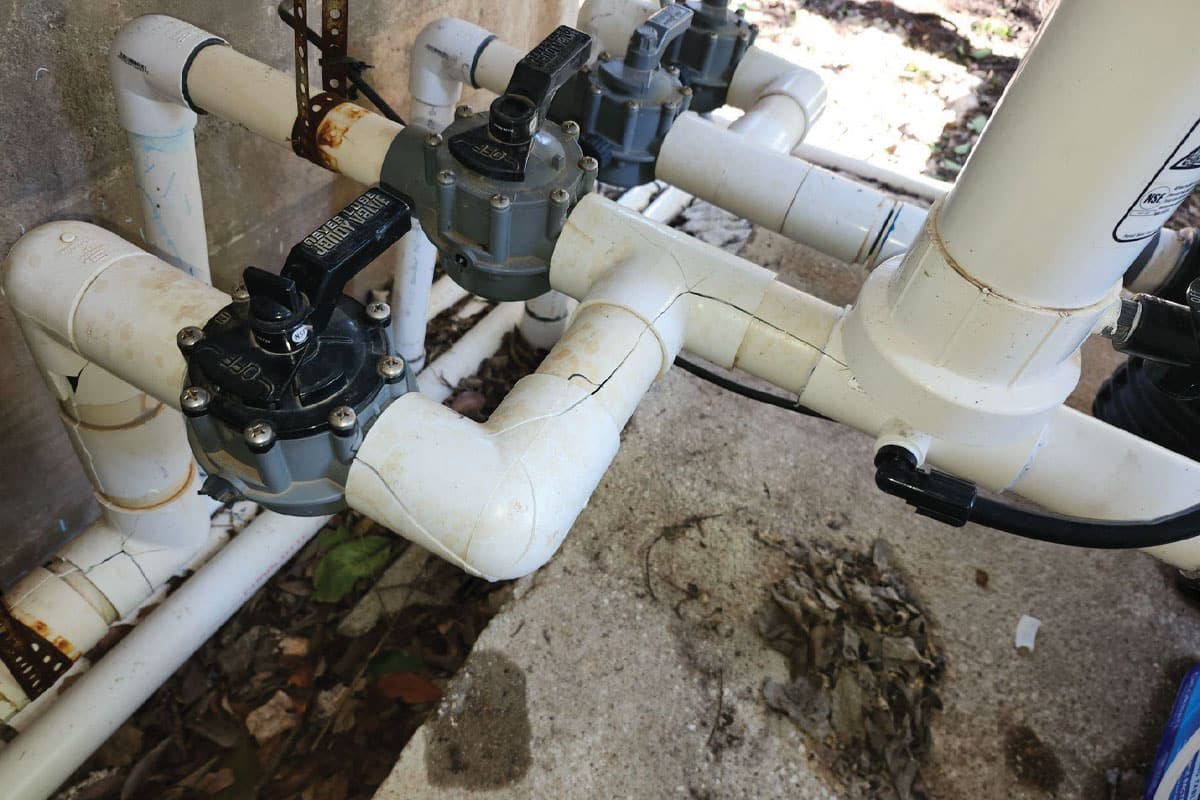Winter in Austin, Texas might not bring blizzards, but when the temperatures start to dip, it can still spell trouble for your pool equipment. When those rare freezes sneak up, your pool equipment needs to be ready, or things could get messy (and expensive). So, what can you do to avoid a frozen disaster? Let’s dive in.
Check Your Equipment Before It Checks Out
First things first: Is your pump behaving? Got any sneaky air leaks or poor flow? If your equipment isn’t running like it should, now is the time to fix it.
Weak flow = frozen pipes, and frozen pipes = burst pipes.
It’s tempting to procrastinate on those repairs, but waiting until a cold snap can lead to extra costs and more equipment damage to your pool equipment. Don’t let winter catch you off guard—get ahead of the game.
Fact: The worst time to find out your pump needs help is when it’s 25 degrees outside and the stores are closed.
To Insulate or Not to Insulate? That is the Question
Insulation can help, but it’s not always the hero people think it is.
As long as your pump is running and water is flowing, your pipes should be safe from freezing—think of it like keeping the blood circulating to stay warm. But if your pump can’t run for some reason (like a breakdown or power outage), that’s when insulation steps in to save the day.
In that case, you’ll want to:
- Pull the drain plugs to let water out of your equipment, so it doesn’t freeze inside. (i.e. Pumps, filters, heater etc.)
- Wrap pipes and equipment with whatever you have on hand—padded PVC insulation works great, but in a pinch, thick blankets or comforters covered by a tarp will do. The goal is to trap heat and keep moisture out.
Water can freeze solid in just 3 to 5 hours, so don’t underestimate how quickly trouble can strike!
While saltwater does freeze at a slightly lower temperature than fresh water—about 1 to 2 degrees—it’s not enough to save the day. Plus, if your equipment is tucked away in a breezeway or exposed to the wind chill, it’s even more at risk.
The name of the game here is keeping things moving. Flow is your best ally when the temperature drops. If your pump is running, you’re in good shape; if it’s not, it’s time to bundle those pipes up and fast!
Note: While insulation can be helpful, we don’t offer plumbing insulation as part of our services at Reliable Pool Care. If you need help finding materials or have questions about insulation, we’re happy to point you in the right direction.
Freeze Protection: Can You DIY It?
Freeze protection is like a bodyguard for your pool equipment, kicking in when temperatures drop to keep things from freezing. But not all time clocks come with this feature, so it’s worth checking yours before the cold hits. Can you test it yourself? Technically, yes—but there’s a catch.
Testing freeze protection often means exposing wiring, and unless you’ve got experience (and a good tolerance for voltage), this could end in a shock—literally. Worse, you might accidentally damage the system. If you’re not 100% sure, it’s best to leave this one to the pros. We can take a look and make sure everything’s working, so you’re not left high and dry (or frozen and frustrated) when a cold snap comes.
Timing matters: Book your service early enough that we can handle any surprises, but not so early that things break before winter even starts. Procrastination isn’t your friend here—but you already knew that, right?
Automatic Levelers
If your pool has an automatic water leveler, be cautious—freezing weather and fresh water lines do not go well together. You have two options: either insulate the supply line thoroughly or turn it off entirely.
Taking these steps now will save you from the hassle and expense of replacing a damaged leveler later.
Waited Too Long? Don’t Panic—Here’s What to Do
If winter showed up early, and you didn’t get your pool gear prepped or winterized in time, don’t panic!
There are still a few tricks to minimize the damage and keep things from turning into an icy mess. If you lose power or the weather changes suddenly you need to think fast.
- If your equipment sits above or parallel to your pool’s waterline:
Pull all the drain plugs to drain the water from your equipment. This will prevent freezing and reduce the risk of cracks or bursts. - Insulate with what you’ve got:
If you don’t have fancy PVC insulation on hand, grab what you’ve got: thick blankets, old comforters, sleeping bags—whatever can trap some warmth. Cover everything with a tarp to keep things dry.
Winter may be the season for hot cocoa and ugly sweaters, but it’s no time to leave your pool equipment out in the cold. A little preparation now can save you from a costly and stressful mid-freeze scramble.
Need help with winterizing? Give us a call at 512-336-2273—we’re just a phone call away to keep your pool safe and sound through the cold.!
Stay warm and happy swimming!


